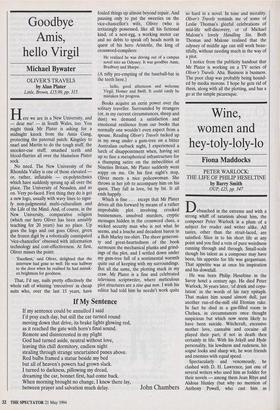Goodbye Amis, hello Virgil
Michael Bywater
OLIVER'S TRAVELS by Alan Plater Little, Brown, £15.99, pp. 315 Here we are in a New University, and — dear me! — in South Wales, too. You might think Mr Plater is asking for a midnight knock from the Amis Gang, protecting the paternal patch: Kingsley to snarl and Martin to do the tough stuff, the snooker-cue stuff, smashed teeth and blood-flurries all over the blameless Plater sock.
No need. The New University of the Rhondda Valley is one of those elevated — or, rather, inflatable — ex-polytechnics which have suddenly sprung up all over the place. The University of Neasden, and so on. Very po-faced. First thing they do is get a new logo, usually with wavy lines to signi- fy non-judgmental multi-culturalism and the Life of the Mind. And, of course, in the New University, comparative religion (which our hero Oliver has been amiably teaching for 20 years) has no place. Up goes the logo and out goes Oliver, given the frozen digit by a robotically constipated `vice-chancellor' obsessed with information technology and cost-effectiveness. At first, Oliver misses the point:
'Excellent,' said Oliver, delighted that the interview had gone so well. He was halfway to the door when he realised he had mistak- en brightness for goodness.
That, I'd say, nails pretty effectively the whole raft of whining 'executives' in cheap suits who, over the last 15 years, have fouled things up almost beyond repair. And pausing only to put the sweeties on the vice-chancellor's wife, Oliver (who is irritatingly possessed, like all his fictional kind, of a nest-egg, a working motor car and no debts to speak of) heads north in quest of his hero Aristotle, the king of crossword-compilers:
He realised he was driving out of a campus novel into an Odyssey. It was goodbye Amis, Bradbury and Sharpe...
(A nifty pre-empting of the baseball-bat in the teeth here.)
.. hello, good afternoon and welcome Virgil, Homer and Swift. It could easily be mistaken for progress.
Books acquire an eerie power over the solitary traveller. Surrounded by strangers (or, in my current circumstances, sheep and dust) we demand a satisfaction and emotional resilience from our books that normally one wouldn't even expect from a spouse. Reading Oliver's Travels tucked up in my swag under a gum-tree on a bitter Australian outback night, I experienced a lurch of disappointment when, having set up so fine a metaphorical infrastructure for a thumping satire on the imbecilities of Nineties Britain, Mr Plater suddenly went soppy on me. On his first night's stop, Oliver meets a nice policewoman. She throws in her job to accompany him on his quest. They fall in love, bit by bit. It all ends happily.
Which is fine . . . except that Mr Plater drives all this forward by means of a rather improbable plot involving crooked businessmen, unsolved murders, cryptic messages hidden in the crossword clues, a wicked security man who is not what he seems, and a louche and decadent baron in a Bob Marley tee-shirt. The sheer generosi- ty and great-heartedness of the book surmount the mechanical plunks and grind- ings of the plot, and I settled down under my gum-tree full of a sentimental warmth quite out of keeping with my surroundings. But all the same, the plotting stuck in my craw. Mr Plater is a fine and celebrated television scriptwriter, where meticulous plot structures are a sine qua non. I wish his editor had told him he needn't work quite so hard in a novel. In tone and morality, Oliver's Travels reminds me of some of Leslie Thomas's gleeful celebrations of mid-life self-discovery, or of Michael Malone's lovely Handling Sin. Both Thomas and Malone realised that the odyssey of middle age can still work beau- tifully, without needing much in the way of a plot.
I notice from the publicity handout that Mr Plater is working on a TV series of Oliver's Travels. Aha. Business is business. The poor chap was probably being hound- ed by media morons. I hope he gets rid of them, along with all the plotting, and has a go at the simple picaresque.




































































 Previous page
Previous page